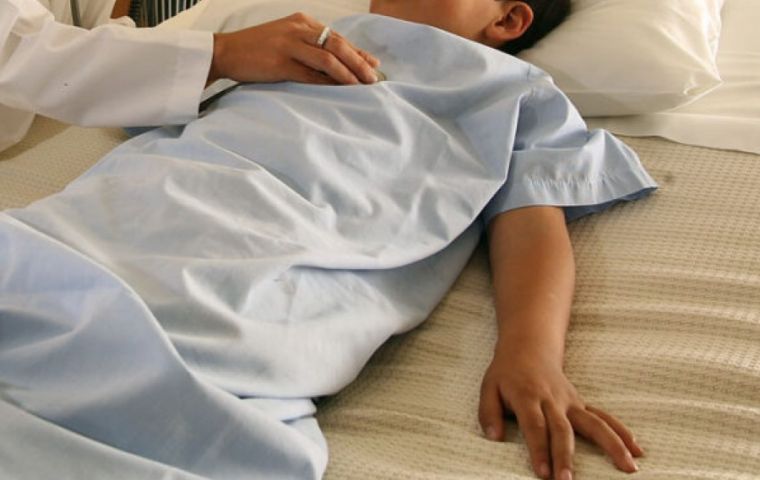MercoPress. South Atlantic News Agency
Eight cases of new hepatitis detected in Argentina, one in critical condition
 The Rosario child has been listed as eligible for liver transplant at the earliest
The Rosario child has been listed as eligible for liver transplant at the earliest Argentina's health authorities are investigating 8 cases of acute hepatitis which are suspected of belonging to the new variant of unknown origin, Health Minister Carla Vizzotti confirmed Friday.
“There is an alert about cases of hepatitis that are emerging in the world,” Vizzotti said in a radio interview.
“In Argentina, we have eight suspected cases, of which five had a positive PCR for adenovirus and the other three are being studied,” she added.
She also pointed out that for now none of the minors have needed a transplant, although three of them do suffer from “severe hepatitis” and could require one.
Later reports from the city of Rosario confirmed the eigh-year-old patient there had been listed on the Incucai national transplant agency, due to his critical condition, The transplant needs to be performed at the earliest time possible, Rosario physicians said.
According to his relatives, the child had not made any recent trips that could link contagion to any foreign pathogen. The child had been vaccinated against hepatitis A and B, his parents added.
Doctor Alejandro Costaguta of the Sanatorio de Niños of Rosario explained it was not always possible to determine the reasons for liver failure. He also denied that for the moment there was an outbreak of acute hepatitis in the area.
The case became known Wednesday night when the National Ministry of Health confirmed that it is a case of severe hepatitis of unknown origin, with similar aspects to those reported by the World Health Organization (WHO), which issued a global alert for more than 230 cases in Europe and Asia.
“A case was detected in the city of Rosario of an 8-year-old boy with severe hepatitis of as yet undetermined cause. It is in the process of investigation and study. Hepatitis A, B, and C have been ruled out but we are waiting for the results of D, E, and other causes that we always study,” said Santa Fe Health Minister Sonia Martorano at a press conference.
The symptoms of severe liver damage are yellowing of the skin and eyes, tiredness or fatigue, and dark urine.
The Health Ministry has also said in a statement that these eight cases “have not yet been classified as severe hepatitis of unknown origin,” and “that this is not an outbreak but a situation that does not escape from what is usually reported, since every year cases with similar pictures of severe acute hepatitis without a diagnosis are registered.”
The World Health Organization (WHO) issued an alert on this type of hepatitis on April 5, after it was detected in the United Kingdom in children under 10 years of age with no previous illnesses.
There are 228 cases detected in some twenty countries and at least four deaths, all minors, due to this acute pediatric hepatitis of unknown origin.
According to WHO, the age of the patients varies from one-month-old infants to 16-year-old adolescents, most of whom do not present fever or viruses associated with the various known types of hepatitis (A, B, C, D, and E).
WHO indicated in its April 23 report that a tenth of the children affected up to then had required a liver transplant after contracting this new disease, which usually causes abdominal pain, diarrhea, or vomiting.
The health organization has recommended the Member States monitor any potential case and reported on it to gather information and be able to trace the source of the disease.
WHO theorized that the illness may be caused by an adenovirus, type F41, detected in dozens of these cases, a virus normally associated with the common cold and stomach viruses.




Top Comments
Disclaimer & comment rulesCommenting for this story is now closed.
If you have a Facebook account, become a fan and comment on our Facebook Page!